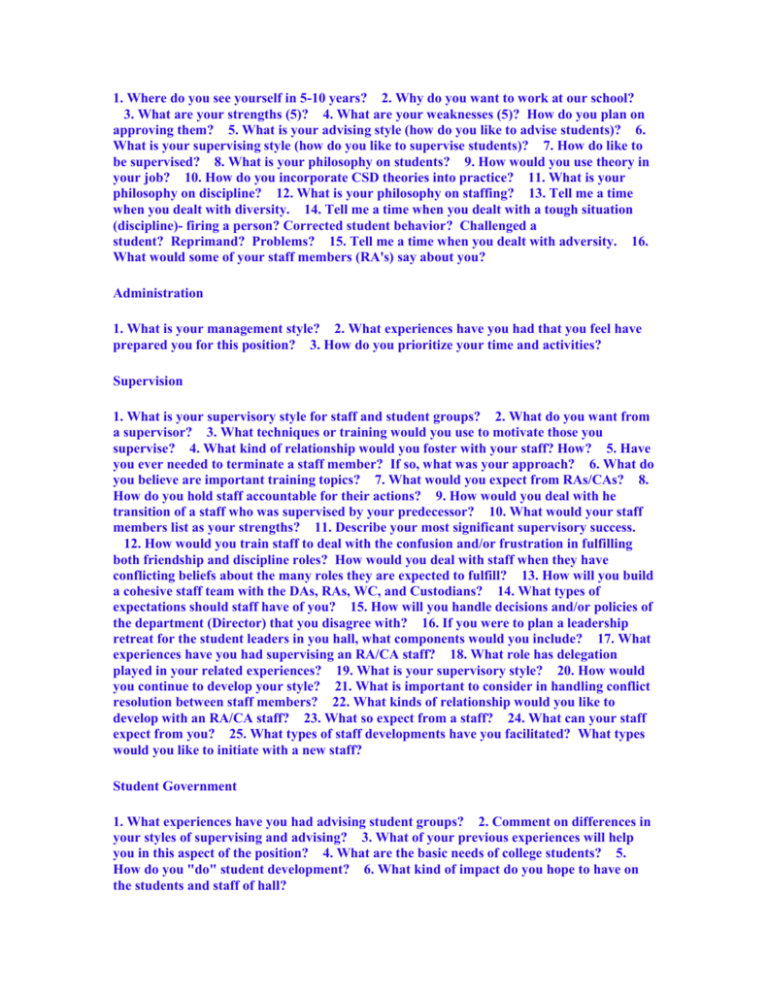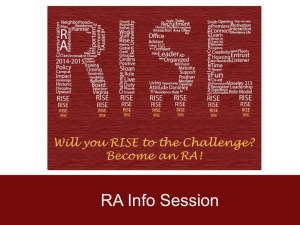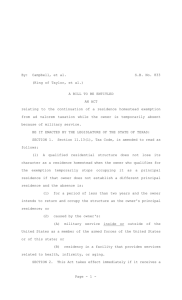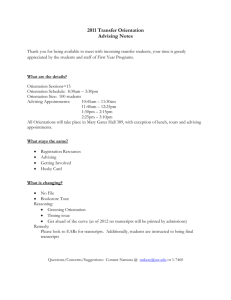Common RHD Questions asked at Interviews
advertisement

1. Where do you see yourself in 5-10 years? 2. Why do you want to work at our school? 3. What are your strengths (5)? 4. What are your weaknesses (5)? How do you plan on approving them? 5. What is your advising style (how do you like to advise students)? 6. What is your supervising style (how do you like to supervise students)? 7. How do like to be supervised? 8. What is your philosophy on students? 9. How would you use theory in your job? 10. How do you incorporate CSD theories into practice? 11. What is your philosophy on discipline? 12. What is your philosophy on staffing? 13. Tell me a time when you dealt with diversity. 14. Tell me a time when you dealt with a tough situation (discipline)- firing a person? Corrected student behavior? Challenged a student? Reprimand? Problems? 15. Tell me a time when you dealt with adversity. 16. What would some of your staff members (RA's) say about you? Administration 1. What is your management style? 2. What experiences have you had that you feel have prepared you for this position? 3. How do you prioritize your time and activities? Supervision 1. What is your supervisory style for staff and student groups? 2. What do you want from a supervisor? 3. What techniques or training would you use to motivate those you supervise? 4. What kind of relationship would you foster with your staff? How? 5. Have you ever needed to terminate a staff member? If so, what was your approach? 6. What do you believe are important training topics? 7. What would you expect from RAs/CAs? 8. How do you hold staff accountable for their actions? 9. How would you deal with he transition of a staff who was supervised by your predecessor? 10. What would your staff members list as your strengths? 11. Describe your most significant supervisory success. 12. How would you train staff to deal with the confusion and/or frustration in fulfilling both friendship and discipline roles? How would you deal with staff when they have conflicting beliefs about the many roles they are expected to fulfill? 13. How will you build a cohesive staff team with the DAs, RAs, WC, and Custodians? 14. What types of expectations should staff have of you? 15. How will you handle decisions and/or policies of the department (Director) that you disagree with? 16. If you were to plan a leadership retreat for the student leaders in you hall, what components would you include? 17. What experiences have you had supervising an RA/CA staff? 18. What role has delegation played in your related experiences? 19. What is your supervisory style? 20. How would you continue to develop your style? 21. What is important to consider in handling conflict resolution between staff members? 22. What kinds of relationship would you like to develop with an RA/CA staff? 23. What so expect from a staff? 24. What can your staff expect from you? 25. What types of staff developments have you facilitated? What types would you like to initiate with a new staff? Student Government 1. What experiences have you had advising student groups? 2. Comment on differences in your styles of supervising and advising? 3. What of your previous experiences will help you in this aspect of the position? 4. What are the basic needs of college students? 5. How do you "do" student development? 6. What kind of impact do you hope to have on the students and staff of hall? Senate 1. What is your experience working with hall senate? What is the most positive aspect of working with this group? The most challenging? 2. What kind of relationship would you like to develop with your hall senate? How would you accomplish this? 3. What do you expect from student leaders? 4. If you were to plan a student leadership retreat for the student leaders in your hall, what components would you include? 5. What can student leaders expect from you? Programming 1. What should be the results of a students’ experience in a residence hall? 2. What impact have you made through your efforts in programming? 3. Tell us a program or project one or some of your students have taken from start to finish and what they learned in the process. What was your role in this? 4. How will you communicate the importance of programming to the RAs? To residents? 5. What have you found to be successful methods to attract residents to programs and/or activities? 6. Relate experiences you have had in programming or what experiences you have had which could be related to residence hall programming. 7. What do you think residential programming is supposed to accomplish? 8. What kinds of programming have you done? 9. What programming efforts have you most enjoyed? What areas of programming would you like to pursue in the job if any? Student Development 1. Tell me why you think living in the residence halls is a good thing. How do we communicate this to residents? 2. What should residents “get out of” living on campus? 3. How do you develop a sense of community responsibility? 4. What kind of impact do you hope to have on the students and staff of a hall? 5. Describe a situation in which you have been an advocate for a student or an issue. What did you learn? 6. What lessons have you learned from college students? 7. What are the needs of first year students? 8. What are issues facing college students today? Discipline 1. What do you think students learn from the discipline process? 2. How do you teach students to develop a sense of mutual respect and consideration for one another? What happens if all of your efforts seem to fall on deaf ears? 3. How would you foster and encourage positive behavior by students? 4. How would you train staff to deal with the confusion and/or frustration in fulfilling all of the roles of the RA position (including discipline)? Professional Development 1. Knowing that a hall coordinator is essentially “temporary” (i.e., very few people retire from this position), how does this position relate to your long-term career aspirations? 2. What areas of “expertise” will you bring our department? 3. What have you done in the areas of staff development for student staff? For professional staff? 4. What are some of the pertinent issues facing our profession? 5. What professional development opportunities would you find beneficial? What do you hope to take with out of these experiences? 6. What types of committee work would interest you? Counseling / Advising 1. How would you get to know the students at ________ ? 2. What is your advising style? What if it doesn’t seem to be effective with the group of students you are working with? 3. What would you do to promote an academic environment in your residence hall? 4. Have you had experiences academically advising students? In what capacity? 5. How does advising students on her/his academics differ from personal issues? How are they similar? Minority / International Student Awareness and Sensitivity 1. What types of diverse populations have you worked with? 2. How do you envision international student integration into the campus housing community? 3. Do you believe minority students have special needs? If so, what are these needs? How would you strive to meet them? 4. Describe any training or experiences you’ve had in cross-cultural awareness, racial issues and sexual orientation. 5. Describe experiences you may have had in the past involved with mentoring individuals from underrepresented groups. Is this issue important to you? 6. What types of activities would you consider establishing in your residence hall to promote understanding and appreciation for diversity? 7. What are issuers a minority student might face on a predominantly white campus? 8. Can you describe or discuss a time or experience in which you felt your rights were infringed upon? Miscellaneous 1. What transition issues do you see foresee as you move from the AHC position to the HC position? 2. What experiences have you had with maintenance and custodial staffs? Inhouse dining operation? 3. How would you foster and encourage an attitude of customer service to your staff? 4. What are four things I will remember about you after this interview? 5. How would you envision your ideal coordinator training to be? 6. What characteristics are you looking for in the department you hope to work for? 7. What are expectations you will have of your fellow coordinators? 8. Describe ways that living in the residence halls has impacted you? 9. How do you work with ambiguity? 10. What are some of the issues associated with being in such a highly visible position? 11. What are some of your short and long-term goals? 12. Describe one challenging work experience and how you resolved it. 13. What aspect of your current position do you enjoy the most? 14. Why are you interested in a career in student services? 15. What experiences do you hope to gain that are different from what you are currently doing? 16. Describe a particularly challenging situation you were involved in and which you are proud of the outcome. 17. What is something in your professional life that you did not include on your resume? 18. What type of committee involvement would interest you? 19. Why ______ ? 20. How will you manage the many demands on your time (job paperwork, social life)? 21. If I were to look at your desk on any given day, what would it look like? 22. What is your organizational style? 23. What attracts you to this position? 24. If I were to talk to three of your residents, what would they tell me about you? 25. What motivates you to put forth your greatest effort? 26. Any plans for what you would like to be doing in five years? 27. What kinds of interaction with students do you most enjoy? 28. How would you want to be remembered by your students? By fellow hall coordinators? By the University/Department? Legacy? Hall Secretary Questions 1. Have you had experience working with a secretary? 2. What role do you see the secretary playing in the hall? 3. What role do you see the hall coordinator playing in the hall? 4. If you were to make changes in the administration of the hall, in what manner would you do so? 5. How do you deal with conflict at work between staff members (student staff and/or professional staff)? 6. How do you deal with stress? How will we know if you’re stressed? 7. Talk to us about your organizational style and skills. 8. Deadlines are a big part of this job. How do you handle them? How far in advance do you generally plan? 9. Faced with the multiple tasks of the position, how do you set priorities? 10. What are your thoughts about starting this position and working with a secretary who has many more experience in the halls and on this campus than you do? AFFECTIVE IMPRESSIONS AND CHARACTERISTICS TO HAVE 1. Genuineness. 2. Self-awareness. 3. Verbal Ability. 4. Interest in Students. 5. Interest in Residence Halls. 6. Listening Sensitivity. 7. Other Impressions. 8. Administrative Skills (attention to detail, communication, record keeping, health aide, reports, working relationships with department/university personnel). 9. Supervision (recruitment and selection, training, evaluation, community development, hall secretary, DAs, WCs, accountability). 10. Discipline (philosophy, contact, encouragement, referrals, experience, administrative hearings). 11. Professional Development (short & long-term goals, involvement, presentations, areas of “expertise”, staff developments, pertinent issues, planner and/or participant). 12. Communication Empathy: identifies with others’ feelings and ideas. Listening skills: pays thoughtful attention to person’s verbal and nonverbal expressions. Sensitive: responds appropriately to another person’s feelings. Verbal skills: Ability to verbalize ideas and feelings Approachability: easy to relate to. Friendly: outward shows interest and good will towards people. Assertiveness: Feedback: gives and receives constructive comments and evaluations. Personal Characteristics Open: Shares thoughts and feelings. Honest: fair and straightforward. Genuine: sincere and portrays a true self-image. Flexible: adjusts behavior to effective function in a variety of circumstances. Open-minded: impartially views both sides of situations. Sense of humor: can be amused at self and other appropriate situations. Self awareness: knows self and capabilities and strives for personal growth. 13. Leadership Innovative: imaginative, constructive and action-oriented. Supportive: appropriately encourages others. Enthusiasm: displays energetic commitment or concern. Self confident: relistic assessment of abilities and the courage to exhibit them. Decisionmaking: recognizes situations, investigates, chooses a method, carries out this method and evaluates the degree of success. 14. Orientation to Others Caring: actively shows interests and concern. Outreach: extends self, services and knowledge to others freely. Perceptive: indicates understanding of people and situations as the result of observation. Resource person: familiar with services offered by the university and community or knows where to find the appropriate information.






